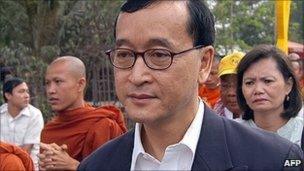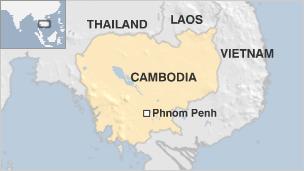Exiled Cambodian opposition leader given jail term
- Published

Sam Rainsy was sentenced in his absence as he is living in self-imposed exile
Cambodian opposition leader Sam Rainsy has been sentenced to 10 years in jail after being found guilty of altering public documents and disinformation.
The government accused Mr Rainsy of manipulating a map to show that Vietnam had encroached on Cambodia's territory.
His party has accused the Cambodian government of ceding territory to its larger and more powerful neighbour.
Mr Rainsy was sentenced in his absence as he has been living in self-imposed exile in France for the past year.
Unmarked border
The BBC's Guy Delauney in Phnom Penh says the only surprise was that Mr Rainsy's sentence was not longer. He could have faced up to 18 years in prison.
The opposition leader has been spending recent weeks trying to engineer a way of coming back to Cambodia, but now his return seems further away than ever, our correspondent says.
Mr Rainsy is paying a heavy price for his attempts to show that Cambodia is losing land to Vietnam - a sensitive subject, as many Cambodians make no secret of their loathing for all things Vietnamese, he adds.

The two countries officially began demarcating their contentious border in September 2006, in a bid to end decades of territorial disputes.
The 1,270km (790-mile) border has remained essentially unmarked and vague since French colonial times, with stone markers and boundary flags having disappeared, while trees once lining it were cut down.
When a new border line was agreed by the two governments, some Cambodians lost their land, and Mr Rainsy took up their case.
In January, he was given a two-year jail term for encouraging villagers to uproot border markings, in protest at Cambodia's government.
The following month, he was charged with manipulating a map to show that Vietnam had encroached on Cambodia's territory.
In his defence, Mr Rainsy said he had simply downloaded the document from Google.
The Sam Rainsy Party has accused the government of using the judicial system to silence the opposition. But the government insists that the courts are independent - and simply enforcing the law.